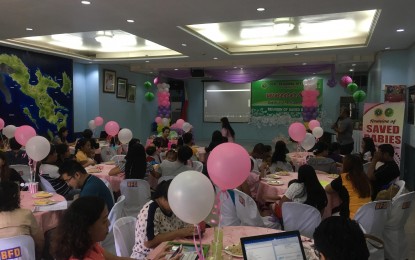
SAVED BABIES. Mothers, babies and other stakeholders gather at the Department of Health's regional office in Legazpi City on Friday (Oct. 26, 2018) to celebrate and hear testimonies of babies saved from different disorders because of early detection through Newborn Screening. (Photo by Connie Calipay)
LEGAZPI CITY -- The Department of Health's (DOH) regional office here conducted a "Reunion of Saved Babies" on Friday to show parents and the public living proof that Newborn Screening (NBS) can save lives.
Hundreds of mothers, babies and other stakeholders gathered at the RC Daguinsin Hall of the DOH office to celebrate and hear testimonies about babies saved from different disorders through early detection using NBS.
“This aims to showcase and encourage them to continuously comply with the treatment regimen for children with disorders, and to show support to our saved babies,” said Dr. Monrey Isaiah Mancilla of the DOH-Family Health Cluster.
He added that with this kind of activity, they would be able to encourage more mothers to submit their babies to NBS after birth, especially during the first 24 hours.
“These babies are saved because of early detection of their disorder through NBS. Sayang ang isang buhay (One life is precious),” Mancilla said.
He noted that the most common detected disorder among babies is glucose-6-phosphate dehydrogenase (G6PD) in which case there are some food and medicine that are prohibited to be taken, otherwise, the infant would suffer from anemia.
“We monitor, conduct lectures and provide medicines for these babies so that they will be saved and have a better future,“ he said.
Mancilla said in the past, they monitored a baby with congenital hypothyroidism (CH) that was detected through NBS and now, that child is an engineering student.
Mary Ann Gabion from Gubat, Sorsogon, who has a three-year-old son with disorder, said in an interview, “Maganda po ang programa na ito ng DOH. Dahil sa NBS, nalaman namin agad ang kalagayan ni baby at nabigyan agad ng gamot na kailangan niya. Tinatawagan nila ako para sa monitoring ni baby at ok naman po ang anak ko (This program of DOH is good. Because of NBS, we immediately learned about the condition of my son. He was able to get the right medicine. DOH continues to monitor my son and, so far, he is doing good)."
Newborn screening is the practice of testing every newborn for certain harmful or potentially fatal disorder that is otherwise not apparent at birth. (PNA)
